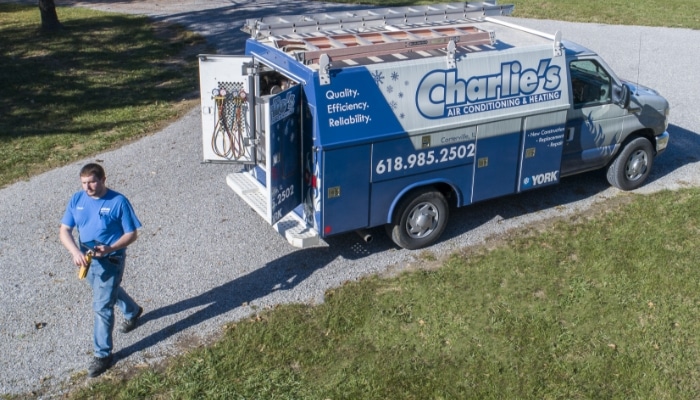AC Installation Near Carterville, IL
Upgrade the AC Unit in Your Southern, IL, Home or Business
Maybe your old air conditioner gave out, or you are updating your unit to improve energy efficiency and lower utility bills. Now it’s time for AC Installation, a field where our installers, some with more than three decades of experience, really shine as the professionals they are.
AC installation should never be trusted to handymen or amateurs. The experts say doing so can be dangerous for your home or business and also cause you to damage an expensive piece of equipment.
Depending on what kind of AC you are looking for - central air conditioning systems come in a variety of styles - our installers may be in the best position to answer your AC-related questions.

AC Installation FAQs
You should consider installing a new AC system if your current system is outdated, inefficient, or frequently requires repairs. Signs that it may be time for a replacement include inconsistent cooling, rising energy bills, frequent breakdowns, excessive noise, or if your current system is over 10-15 years old. Additionally, if you're planning a home renovation or experiencing discomfort due to inadequate cooling, upgrading to a new AC system can improve comfort, energy efficiency, and reliability.
Several factors influence the cost of AC installation, including:
- Size and Type of Unit: Larger or more advanced units typically cost more.
- Installation Complexity: Factors like ductwork modifications or accessibility can affect installation costs.
- Additional Components: Upgrades such as thermostats or air purifiers can increase the total cost.
- Labor Costs: Installation fees vary based on the contractor's rates and expertise.
- Location: Local labor and material costs, as well as permits, can impact overall expenses.
- Warranties and Service Plans: Optional add-ons may affect the total price.
To determine the appropriate size AC unit for your home:
- Calculate Square Footage: Measure the total area of your home in square feet.
- Use BTU Guideline: Estimate 20 BTUs per square foot of living space.
- Consider Factors: Account for ceiling height, insulation, number of windows, and climate.
- Professional Assessment: Have an HVAC technician perform a load calculation using the Manual J method for precise sizing.
Properly sized units ensure optimal efficiency, comfort, and longevity. An undersized unit will struggle to cool, while an oversized unit will cycle too frequently.
New AC units are significantly more energy-efficient than older models. Here are the main ways they are:
- SEER ratings (efficiency measure) have increased:
- Old units: typically 8-10 SEER
- New units: minimum 13 SEER, with some up to 25+ SEER
- Energy savings:
- Can reduce cooling costs by 20-40%
- Higher SEER units save more
- Technology improvements:
- Variable-speed compressors
- Smart thermostats integration
- Better coolants
- Environmental impact:
- Lower energy use means reduced carbon footprint
- Use of eco-friendlier refrigerants
- Payback period:
- Energy savings often offset higher initial cost within a few years
Consider professional assessment for optimal efficiency gains.
Installing a high-efficiency AC unit offers several benefits. These units consume less energy, leading to lower utility bills and reduced environmental impact. High-efficiency models often come with advanced features that improve indoor air quality and provide more consistent cooling. They also tend to be quieter and have a longer lifespan due to better components and technology. Additionally, you may be eligible for rebates or tax incentives, further reducing the overall cost of upgrading to a high-efficiency system.
The SEER rating (Seasonal Energy Efficiency Ratio) measures an air conditioner's cooling efficiency over a typical cooling season. A higher SEER rating indicates greater energy efficiency, meaning the unit uses less energy to cool your home, resulting in lower utility bills. It is important because it helps you compare the efficiency of different models, guiding you to more cost-effective and environmentally friendly choices. Additionally, units with higher SEER ratings often qualify for rebates and incentives, providing further savings.
Ins & Outs of AC Installation
There are several types of central air conditioning systems. A few are listed here.
Perfect for many commercial buildings is the packaged air conditioner, which comes with electric AC and a heat pump. They are positioned outside of the facility. A ductless mini split system allows you to move and balance AC in your home. Moving air from the outside to the inside, these cooling systems do not require any ductwork in your home to work properly. A split system is named just that because it splits the AC between outside and inside of your home or business. The blower and evaporator coils are inside the building, while outside is the metal cabinet that holds the compressor and condenser coil. This is the most popular kind of central air conditioning system in the US. A heat pump system, which, admittedly, does not sound like it would cool you down, is another energy efficient means of cooling down your house. The pump outside the house draws in the steamy air from outside. The indoor air handler cools the air. These systems can be geothermal.


